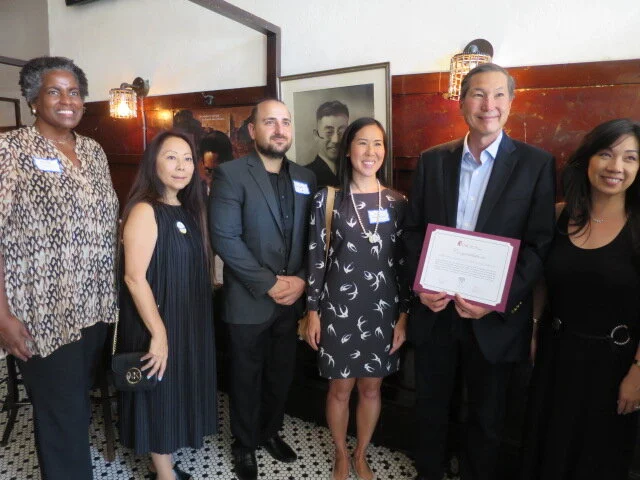NAMING PROJECTS
Honoring contributions from visionary Japanese Americans throughout Little Tokyo.
Naming Projects are plaques, monuments, and other signifying indicators that LTHS has worked to place throughout the city. They are reminders of moments and people in our history who have had the greatest impact.
MAP OF NAMING PROJECT SITES COMING SOON
Koyasan
2023
One of the long-standing temples in Little Tokyo, Koyasan has been at their present location since 1941. They sponsored a famous Boy Scout Drum & Bugle Corps which has performed at many distinguished venues and events throughout the years and has produced many dozens of eagle scouts.
Kame Restaurant
2022
Bunkado is located on the site of Kame Restaurant, founded by Hamanosuke Shigeta in 1884. RAFU STAFF AND WIRE REPORTS. The Los Angeles City Council on Wednesday voted to recognize Kame Restaurant, which opened in 1884, as the first Japanese-owned business in Little Tokyo.
Click here to read the Los Angeles City Council motion.
Click here for a gallery of photographs.
RELATED GALLERIES AND NEWS
Imagine Little Tokyo Short Story Contest Editing Workshop
Jan 13, 2023
17th Annual Los Angeles Archives Bazaar
Nov 14, 2022
Nov 14, 2022
The Finale Club
2020
PROJECT COORDINATOR: MIYA IWATAKI
LOCATED: 230 1/2 East First Street, Los Angeles
During WWII, forced removal and imprisonment of Japanese Americans into concentration camps and turned the thriving Little Tokyo community into a shuttered ghost town. For African Americans migrating to the West Coast seeking wartime jobs, Little Tokyo was one area without discriminatory housing covenants. They moved in, opened businesses, and Little Tokyo became known as “Bronzeville:”
All night “Breakfast Clubs” sprung up in Bronzeville, patronized by jazz musicians and late night jazz aficionados. Among them was the Finale Club at 230 ½ E. First Street. In 1946, this confluence of music, race, and politics led to an historic performance at The Finale Club. Two jazz greats – sax virtuoso Charlie Parker and trumpeter extraordinaire Miles Davis – played at the Finale when Little Tokyo was Bronzeville and while the Japanese American community was imprisoned due to unfounded war hysteria.
In recognition of the important historic circumstances of exclusion and discrimination shared by the Japanese American and African American communities which led to the unique creation of Little Tokyo/Bronzeville; and to memorialize and educate music lovers about the rare performance of jazz greats Charlie Parker and Miles Davis at the Finale Club; the Little Tokyo Historical Society won approval from the Mayor and LA City Council to install an Historical Monument sign in front of the current property at 230 ½ East First Street, Little Tokyo.
Sei Fujii & J. Marion Wright
2015
PROJECT COORDINATORS: CAROLE FUJITA & JEFFREY GEE CHIN
LOCATED: Japanese Village Plaza
Sei Fujii (?-1954) is known as a founder of the Kashu Mainichi, California Japanese Daily News. After World War II, in Sei Fujii v California, he and J. Marion Wright convinced the California Supreme Court to overturn the California Alien Land Law, which had heavily restricted Japanese ownership and leasing of land and property since 1913. J. Marion Wright, a Los Angeles pioneer and lawyer, helped California’s Japanese, aliens and United States citizens alike, to obtain their civil rights. Throughout his 57 years as an active lawyer, his most significant legal achievements were involving Japanese clients between 1913 and 1952. In a 1924 fight to get better medical care for Japanese community, attorney Marion Wright won the Jordan vs. Tashiro case before the United States Supreme Court enabling Japanese Hospital to be built and opened in the Boyle Heights neighborhood east of Little Tokyo in 1929. The LTHS dedicated the Sei Fujii Memorial Lantern in August 2015 which is located at the Japanese Village Plaza in Little Tokyo. The naming site project honors Fujii's and Wright’s contributions to the Little Tokyo and Japanese American communities.
RELATED GALLERIES & NEWS:
Toyo Miyatake
2013
PROJECT COORDINATOR: BILL WATANABE
LOCATED: Toyo Miyatake Way, between South San Pedro and Los Angeles Street slightly south of 2nd St. near the Sakura Crossing Apartments
Toyo Miyatake was a noted photographer based in Little Tokyo who gained fame through his on-the-spot photographs of the WW2 Confinement Site known as Manzanar. The Little Tokyo Historical Society worked with The Related Company in designating a street in their housing development project to be named "Toyo Miyatake Lane" and a full-sized relief of Toyo with a shoulder-slung camera will be erected on the site.
RELATED GALLERIES AND NEWS
Reverend Howard Toriumi
2012
PROJECT COORDINATORS: BILL WATANABE & TAD KOWTA
PROJECT: Toriumi Plaza, northwest corner of First Street and Judge John Aiso Street
Reverend Toriumi was a highly-regarded minister of the Union Church in Little Tokyo and was instrumental in the establishment of several significant community projects such as the Little Tokyo Community Redevelopment Project Area, the Koreisha Chushoku Kai senior nutrition program, and the Parkinsons Support Group. The Little Tokyo Historical Society has been in negotiations with the City of Los Angeles to designate a ground-level open plaza and garden above a public parking structure at First and Aiso Streets, just across from the site of the church which is now the Union Center for the Arts.
RELATED GALLERIES & NEWS:
Nellie Oliver
PROJECT COORDINATORS: BILL WATANABE
LOCATED: TBD
Nellie Oliver was an elementary school teacher in Little Tokyo during the 1920's and 1930's who created her own boys and girls clubs for the Japanese American youngsters growing up in the area without access to such activities. She became a tremendous positive influence for hundreds of young boys and girls who learned about social and life skills in addition to playing sports. The Little Tokyo Historical Society is seeking to designate a street on the east side of a new development at First Street and Alameda called Nikkei Center (formerly the Mangrove Project) which is located very near the school at which Ms. Oliver taught.
Sue Kunitomi Embrey
PROJECT COORDINATOR: NAMING SITE COMMITTEE
LOCATED: TBD
Sue Kunitomi Embrey (1923-2006) was a Little Tokyo native and a leader and activist in the Japanese American community for decades. She was an advocate for social justice, working to better women and children's lives, and to protect workers' rights and dignity. The Little Tokyo Historical Society is working to place a compelling and artistic piece in Little Tokyo to honor her historically significant work in the Japanese American community.















Little Tokyo Historical Society, a nonprofit organization focused on documenting and preserving Japanese American history and heritage, is releasing A Rebel’s Outcry, an illustrated historical biography of civil rights leader Sei Fujii (1882 – 1954).